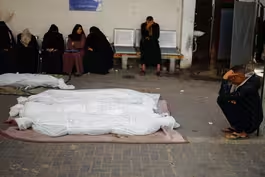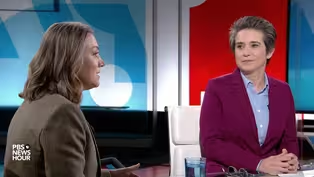
Cancer rates among young women highlight medical blind spots
Clip: 12/4/2023 | 7m 19sVideo has Closed Captions
Rising cancer rates among young women highlight gaps in medical systems
New research is confirming something that doctors have already been noticing, an increase in cancer diagnoses among young women. Ali Rogin explores the reasons behind the increase and the challenges medical systems have when treating young women.
Problems playing video? | Closed Captioning Feedback
Problems playing video? | Closed Captioning Feedback
Major corporate funding for the PBS News Hour is provided by BDO, BNSF, Consumer Cellular, American Cruise Lines, and Raymond James. Funding for the PBS NewsHour Weekend is provided by...

Cancer rates among young women highlight medical blind spots
Clip: 12/4/2023 | 7m 19sVideo has Closed Captions
New research is confirming something that doctors have already been noticing, an increase in cancer diagnoses among young women. Ali Rogin explores the reasons behind the increase and the challenges medical systems have when treating young women.
Problems playing video? | Closed Captioning Feedback
How to Watch PBS News Hour
PBS News Hour is available to stream on pbs.org and the free PBS App, available on iPhone, Apple TV, Android TV, Android smartphones, Amazon Fire TV, Amazon Fire Tablet, Roku, Samsung Smart TV, and Vizio.
Providing Support for PBS.org
Learn Moreabout PBS online sponsorshipAMNA NAWAZ: New research is confirming something that doctors have already been noticing, an increase in cancer diagnoses among young women.
Ali Rogin explores the reasons behind the increase and the blind spots medical systems have when treating young women.
CHARISMA MCDUFFIE, Cancer Patient: For my 30th birthday, my mother actually surprised me with a photo shoot.
I was very excited, because it's my first time actually doing a photo shoot.
ALI ROGIN: For Charisma McDuffie, these photos represent more than a birthday.
They mark the end of a yearslong struggle with breast cancer.
It began in 2019 when McDuffie, then 28 and working full-time in retail, experienced recurring chest pains.
CHARISMA MCDUFFIE: I'm just like, what the heck is wrong with me?
So I go to the doctor, basically told me to take Tylenol.
So it was just like, OK, well, went about life.
It's still hurting.
ALI ROGIN: Six months and four doctors later, she finally received the diagnosis that would change her life.
CHARISMA MCDUFFIE: So, the biopsy came back positive for breast cancer.
And I'm just like, what?
ALI ROGIN: McDuffie, now 32, has no family history of cancer and was diagnosed with triple negative breast cancer, an aggressive form of the disease more common in Black women.
CHARISMA MCDUFFIE: I try to be positive.
Even when I'm not so positive, I try to project that.
ALI ROGIN: She underwent chemotherapy, which caused her to lose her hair, and had a double mastectomy followed by breast reconstruction, physical changes that still leave emotional scars.
CHARISMA MCDUFFIE: I didn't really have self-esteem issues before, until after this experience.
Obviously, because now I have a double mastectomy, I have scars.
I'm a different person completely than the normal 32-year-old.
ALI ROGIN: Studies show that young people, especially young women, are experiencing the highest rate of increase in cancer diagnoses.
So some hospitals are coming up with programs specifically tailored to young women.
At Memorial Sloan Kettering Cancer Center, young patients have access to specific support groups, mental health professionals, and fertility clinics.
McDuffie is now a patient of Dr. Shari Goldfarb who co-directs the Young Women with Breast Cancer Program.
DR. SHARI GOLDFARB, Memorial Sloan Kettering Cancer Center: Too often, people are not taken seriously when they're young, or doctors who don't see breast cancer in young women don't think it's breast cancer.
It doesn't come to their mind.
So people are given antibiotics and told to go home.
ALI ROGIN: Dr. Goldfarb says this attitude often means that by the time her young patients begin treatment, their cancer is more advanced and less survivable.
DR. SHARI GOLDFARB: What we see in these women is that they're often diagnosed later with more biologically aggressive tumors.
ALI ROGIN: A 2021 study found that women over 40 with breast cancer saw a decrease in their mortality rates.
But mortality rates in young women remained stagnant.
To Dr. Goldfarb, this demonstrates a major blind spot in the development of cancer drugs.
Younger women are often left out of the clinical trials that could save them.
DR. SHARI GOLDFARB: They're the group that needs it the most, because the biology of their disease tends to be worse.
So they don't get to experience the new drugs that really make a difference and move the needle forward.
ALI ROGIN: But it's not just the recent uptick in breast cancer that has researchers worried.
The fastest growing cancer cases among young people are related to the gastrointestinal system.
DR. ROBIN MENDELSOHN, Memorial Sloan Kettering Cancer Center: And it's been increasing steadily year by year.
So, the knowns is that it's definitely happening, and the unknown is really why.
ALI ROGIN: Dr. Robin Mendelsohn is a gastroenterologist specializing in colon, stomach and esophageal cancer.
She says typical risk factors like obesity don't fully explain what's been happening.
DR. ROBIN MENDELSOHN: In younger patients we usually think, oh, there has to be a family history or it has to be hereditary.
Though that is a small component, the majority of these patients don't have a family history, don't have a known genetic mutation.
Right now, we just don't have one answer.
MEILIN KEEN, Cancer Patient: This is me in the -- I think one of the foster homes I was in, probably 18 months old.
ALI ROGIN: Meilin Keen was born in China and adopted by American parents at the age of 2.
When she was in high school, she says she struggled to pinpoint what was causing her heartburn and acid reflux.
MEILIN KEEN: I, of course, mislabeled it as stress or due to my diet or just other external life circumstances, and not really like, oh, there might be something internally wrong with me.
ALI ROGIN: Earlier this year, the now-27-year-old graduated from law school and was studying for the New York bar exam.
But her plans changed when she was diagnosed with stomach cancer.
MEILIN KEEN: This is me being clueless that I was going to be diagnosed a month later.
It didn't feel real.
It took me a few more minutes to really absorb it, and I had to ask the doctor to repeat it clearly and say, you have stomach cancer.
My life flashed before my eyes in that moment.
ALI ROGIN: Keen tested positive for H. pylori, a bacteria common in Asian countries, which her doctors say likely led to her stomach cancer.
She just finished chemotherapy and is adjusting to the changes to her physical appearance.
MEILIN KEEN: That's why I wear hats, because the hairline.
ALI ROGIN: But her treatment also meant the bar exam would have to wait.
MEILIN KEEN: When I had to call to withdraw from the bar, that was actually the first time I verbally said to someone that I didn't know that I had cancer.
That's the first time I had actually, like, broke down crying.
DR. ROBIN MENDELSOHN: These younger folks, one night, they're out with their friends and then the next day they're diagnosed with cancer, and everything changes in that second.
ALI ROGIN: Dr. Mendelsohn also runs a program for younger patients with G.I.
cancer, each of whom fills out a questionnaire in the pursuit of common denominators among them.
DR. ROBIN MENDELSOHN: So we're trying to explore all options and asking about past history and past family history and then delving into diet habits from as far back as they can remember and medication habits from as far back as they can remember.
And the goal really is to find a high-risk group, so that we can screen that high-risk group.
If we do find cancer at a screening test, it's usually at the early stages.
And in the early stages, it's really, really curable.
ALI ROGIN: Currently, routine screenings for most cancers are not recommended for people under 40, unless considered high-risk.
But Dr. Mendelsohn encourages doctors and young patients to be vigilant.
DR. ROBIN MENDELSOHN: The majority of times, these symptoms are not cancer, but it's so important for both providers and patients to know that this is increasing, so that if they do have symptoms, to get evaluated.
WOMAN: When Charisma came out with her story, she posted the video, and I shared the video.
ALI ROGIN: McDuffie, who leaned heavily on her family for support during her treatment, wonders how things might have been different if doctors took the concerns of young women like her more seriously.
How much of their failure to diagnose you earlier do you think had to do with your age?
CHARISMA MCDUFFIE: A lot, because I still had this pain that was ignored.
By the time they diagnosed me, it's already stage 3, when that was already six, seven months after the first pain.
So it was like maybe it could have been prevented earlier.
Maybe I wouldn't have to do chemo or any other thing if they would have recognized it earlier or took it more seriously.
ALI ROGIN: Fortunately, McDuffie never stopped taking her own concerns seriously, even when she and her family were the only ones.
For the "PBS NewsHour," I'm Ali Rogin in New York City.
How Republicans are campaigning with 6 weeks until Iowa
Video has Closed Captions
Clip: 12/4/2023 | 2m 42s | How Republican hopefuls are campaigning in Iowa with 6 weeks until caucuses (2m 42s)
Israel expands Gaza invasion south, forcing many to flee
Video has Closed Captions
Clip: 12/4/2023 | 4m 59s | Israel expands Gaza invasion south, forcing many to flee areas previously considered safe (4m 59s)
Solar system with 6 planets orbiting in-sync discovered
Video has Closed Captions
Clip: 12/4/2023 | 3m 28s | Solar system with 6 planets orbiting in-sync discovered in Milky Way (3m 28s)
Supreme Court hears Purdue case that could shield Sacklers
Video has Closed Captions
Clip: 12/4/2023 | 6m 11s | Supreme Court hears case that could shield Purdue Pharma owners from opioid lawsuits (6m 11s)
Tamara Keith and Amy Walter on Trump avoiding GOP attacks
Video has Closed Captions
Clip: 12/4/2023 | 9m 8s | Tamara Keith and Amy Walter on the next GOP debate and how Trump is avoiding attacks (9m 8s)
Texas goes green: Leads nation in renewable energy
Video has Closed Captions
Clip: 12/4/2023 | 7m 34s | Texas goes green: How oil country became the renewable energy leader (7m 34s)
Thai workers held hostage in Gaza describe kidnappings
Video has Closed Captions
Clip: 12/4/2023 | 6m 27s | Thai workers held hostage by Hamas describe kidnappings and recovery after release (6m 27s)
Providing Support for PBS.org
Learn Moreabout PBS online sponsorship
- News and Public Affairs

FRONTLINE is investigative journalism that questions, explains and changes our world.

- News and Public Affairs

Amanpour and Company features conversations with leaders and decision makers.












Support for PBS provided by:
Major corporate funding for the PBS News Hour is provided by BDO, BNSF, Consumer Cellular, American Cruise Lines, and Raymond James. Funding for the PBS NewsHour Weekend is provided by...






